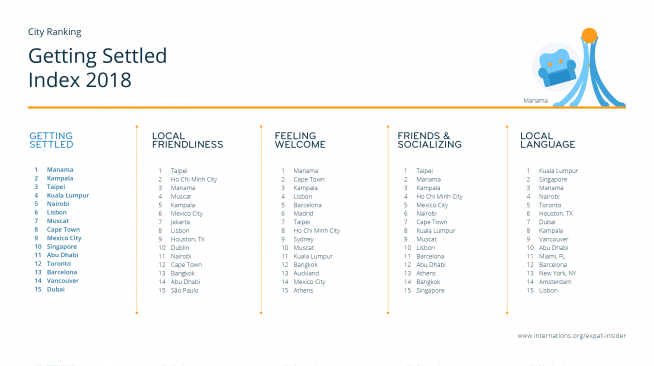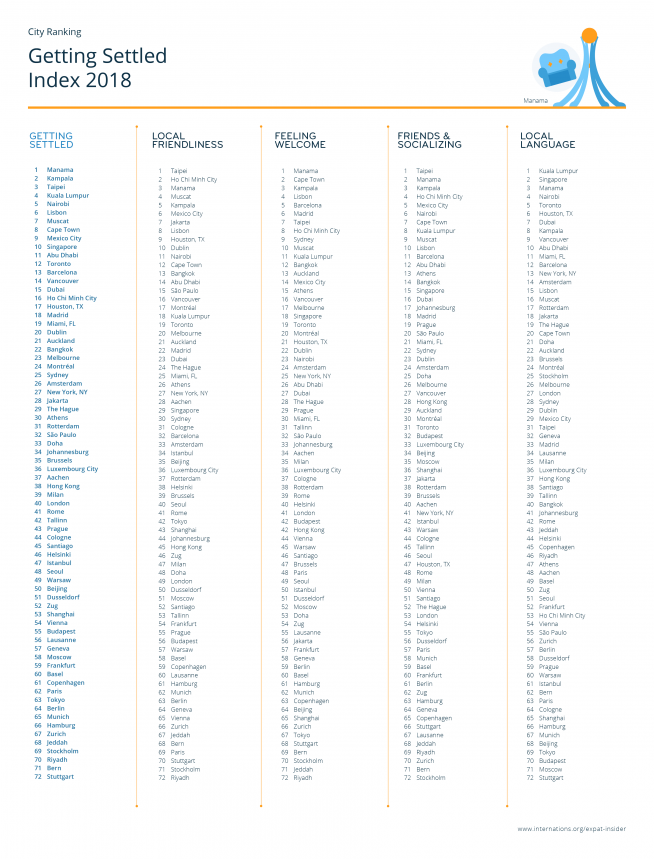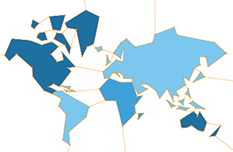Homely, Friendly, Few Language Barriers: Cities for Getting Settled
- #1 Manama outshines the rest by far, being in the top 3 for all Getting Settled subcategories.
- #2 Kampala performs the best globally in terms of expats feeling at home in the city, with over four in five expats (83%) responding positively.
- Despite being the best in the Local Friendliness and Friends & Socializing subcategories, Taipei comes third overall in the Getting Settled Index — the local language (31st) brings it down.
- The only European city to make it into the top 10 is the Portuguese capital, Lisbon, placing sixth.
Methodology
The Getting Settled Index of the Expat City Ranking 2018 covers a range of “soft” factors that can influence how easy it is for expats to find their feet abroad. Respondents were asked to rate their city of residence on a scale of one to seven for several factors. These include, for example, how easy it is to live in the city without local language skills, how happy expats are with their social life, whether or not they feel at home in the city, or how they would rate the general friendliness of the local population. At least 45 respondents were required for a city to be featured, with 72 cities making it into the final city ranking in 2018.
#1 Manama: Warm and Friendly Locals
Taking the gold for the Getting Settled Index is Bahrain’s capital, Manama. The city does remarkably well throughout, landing in the top 3 for each of the subcategories in the index. It performs best, however, in regard to expats feeling welcome, for which it comes first globally. Respondents find it particularly easy to get used to the local culture, with over seven in ten expats (72%) judging the factor favorably. Almost half of the respondents (46%) even feel it was a completely effortless adjustment, giving it the best rating. Close to three in four expats (74%) also agree that they feel at home in the city, compared to 62% of respondents worldwide. An Indian respondent particularly points out the “friendly people and how everyone can adjust easily”.
I appreciate the warmth and friendliness of the people. They are always helpful.
The city is, in fact, awarded the bronze medal for local friendliness. Close to three-quarters of the expats in Manama (74%) find the local population friendly, and 44% even consider them to be very warm and friendly — compared to 23% globally. Similarly, 87% feel that there is a friendly attitude towards foreign residents (vs. 62% globally). A German respondent in Manama appreciates “the warmth and friendliness of the people. They are always helpful.”
The factor in which Manama’s performance wanes somewhat is how easy expats find it to learn the local language. With the city landing in 28th place, two in five respondents (40%) find it hard to learn Baharna Arabic. Despite this, expats for the most part feel that it does not affect their quality of everyday life, with over nine in ten respondents (92%) answering that it is easy to live in Manama without speaking the local language, which is considerably better than the global average, which stands at 48%. It must be noted, however, that the Expat Insider survey was conducted in English, a language widely spoken in Manama, not only due to it being part of the secondary curriculum in schools.
#2 Kampala: Where Expats Feel at Home
Coming in second place in the Getting Settled Index is Kampala. The Ugandan capital features in the top 10 for all the index’s subcategories but does particularly well in both the Feeling Welcome (3rd) and Friends & Socializing (3rd) subcategories.
Out of all the cities which placed in the 2018 Expat City Ranking, Kampala performs the best in terms of expats feeling at home in the city. Exceeding the global average (62%) by over 20 percentage points, over four in five expats (83%) feel at home in Kampala. Unfortunately, when it comes to the other individual factor in the Feeling Welcome subcategory — how easy it is to get used to the local culture — expats are not quite as content. Placing 17th globally, Kampala nonetheless does well, with over two in three expats (69%) finding it easy to get used to the local culture (vs. 61% globally).
Ugandan people are incredibly friendly.
Even if some expats are having a slightly harder time adapting to Kampala’s local culture, they seem to be having few issues establishing new friendships. Kampala coming fourth for the individual factor globally, 70% of respondents agree that finding friends is easy. What is more, expats residing in the Ugandan capital are in general highly satisfied with their social life, with over three in four expats (76%) happy with this factor, compared to 57% globally.
“Ugandan people are incredibly friendly,” according to an expat from the USA, and others agree: over four-fifths (81%) consider the local population friendly toward foreign residents, compared to just 62% of respondents worldwide.
#3 Taipei Takes the Lead in Local Friendliness
New to the Expat City Ranking in 2018 is bronze medal holder, Taipei. The Taiwanese capital does well across the board, obtaining a spot in the top 10 for three of the four Getting Settled subcategories and only falling short for the Local Language subcategory, in which it places 31st.
The majority of expats residing in Taipei (58%) find learning the local language hard, and just over one in five (21%) even feel that it’s very difficult. Expats also feel Taipei is not the easiest city to get around in without local language skills: while it performs better than the global average which stands at 38%, a quarter of expats (25%) nonetheless struggle.
The locals are friendly even if I can only communicate with them through smiles and nods.
Despite this potential language barrier, Taipei comes first in the Local Friendliness subcategory, with expats voting the city best for its local friendliness in general and also specifically towards foreign residents (94% positive responses for each vs. 62% globally for each). One Philippine expat feels that the language barrier has no effect on their relationship with locals: “The locals are friendly even if I can only communicate with them through smiles and nods.”
The friendliness of locals may also positively impact Taipei’s results in the Friends & Socializing subcategory, where the city comes first for the subcategory on the whole but also for both of the individual factors. Almost eight in ten expats living in the Taiwanese capital (79%) agree that it is easy to make new friends there (vs. 46% globally) and similarly, 77% are happy with their social life in Taipei (vs. 57% globally).
The Bottom 3
In the bottom 3 of the Getting Settled Index are Stuttgart (72nd), Bern (71st), and Riyadh (70th). Stuttgart not only ranks last in the Local Language subcategory, it also underperforms in the Local Friendliness subcategory, placing 70th. Not quite half of the respondents (44%) feel that the people of Stuttgart are unfriendly (vs. 21% globally). One US American expat links this to locals’ lack of intercultural understating: “The culture is about 20 years behind what I was used to before moving here. People are also not very understanding when foreigners don't understand the local processes, they get angry instantly when you have ‘stupid’ questions.” Consequently, it seems hardly surprising that over a third (36%) shares that they don’t feel at home in the German city.
Unlike Stuttgart, which scores consistently in the bottom 10 for all four subcategories, Bern closely escapes by ranking 62nd for the Local Language subcategory. This ranking is nonetheless sub-satisfactory, and almost half of the expats (45%) still find it hard to live in Bern without speaking (Swiss) German. This is considerably worse than the global average, which stands at 38%, but not quite as bad as overall loser Stuttgart, where almost three in four expats (74%) find it hard to live without speaking German. Expats in Bern are not happy with their social life either, with 46% unhappy with this factor. This might be linked to the fact that 44% of expats feel that the locals are unfriendly, and 63% find it hard to make new friends in Bern.
Riyadh, on the other hand, performs marginally better in regard to the Local Language subcategory, and while the majority of respondents (59%) finds it hard to learn Arabic, 50% at least find it easy to live in the city without speaking Arabic.
However, Riyadh is the worst city globally for feeling at home and also for adapting to the local culture — the majority of expats (52%) find the latter difficult (vs. 22% globally). One US American speaks about their struggle to adjust to the city, considering the place “restrictive and oppressive”. They also comment on their frustration with the different opening hours in comparison to their home country: “Shops are always shutting down for prayer.” Riyadh also falls short when it comes to expats finding friends and socializing, placing 69th for the respective subcategory. Over half of the expats (52%) are unhappy with their social life (vs. 26% globally).
Locations for Local Friendliness
Following Taipei and just ahead of Manama in the Local Friendliness subcategory is Vietnam’s Ho Chi Minh City, coming in second place for both of the individual factors as well. An outstanding nine in ten expats (90%) find the local population generally pleasant and friendly (vs. 62% globally), and 86% agree that the people of Ho Chi Minh City are generally friendly towards foreign residents. One US American expat feels that this kindness is innate to the Vietnamese culture in general: “The hospitality engrained in the Vietnamese culture establishes a sense of welcome…”
Omanis are very friendly and are very nice to expats.
Also achieving positive responses for the Local Friendliness subcategory (4th) is Oman’s capital, Muscat. The city performs particularly well, coming fourth for the individual factor friendliness towards foreign residents, with over four in five expats (83%) rating this factor favorably — 21 percentage points more than the global average of 62%. A Canadian respondent in the city also points out: “Omanis are very friendly and are very nice to expats.”
Cities Where You Feel at Home
Other cities which perform well in the Feeling Welcome subcategory include Cape Town (2nd), Lisbon (4th), and the Spanish cities, Barcelona (5th) and Madrid (6th). Coming 13th in the Getting Settled Index overall, Barcelona does particularly well with regard to expats feeling at home in the city (5th out of 72), with 81 percent of expats agreeing to the question (vs. 62% globally). One US American expat comments on their general contentment with their life in Barcelona, comparing it to their state of life in their home country: “I love the Catalan people and their peaceful, friendly culture. The pace of life is slower here than in the US, and that has been very calming for the whole family while at the same time, Barcelona is a very exciting city to live in.”
The pace of life is slower here than in the US, and that has been very calming for the whole family while at the same time, Barcelona is a very exciting city to live in.
Likewise, the Spanish Capital, Madrid, performs above average in 18th place for the Getting Settled Index, but does particularly well for expats easily adjusting to the culture, coming 9th out of 72 cities worldwide. Almost four in five expats (78%) feel at home in the city, and another 77% find it easy to adapt to the culture (vs. 61% globally). Another US American expat living in the Spanish capital commented: “It’s easy to live here if you are open and accepting of the culture, learn the language, and have a friendly attitude toward people.”
Scandinavian cities Stockholm (70th) and Copenhagen (63rd), on the other hand, are not just cold weather-wise but also for making expats feeling welcome. About one in three expats living in Copenhagen (34%) don’t feel at home in the city, and similarly, over four in ten expats living in Stockholm (43%) don’t feel at home there either (vs. 23% globally). A British respondent points out how it is “hard for non-Swedes to fit in. It is not as social as most other countries and less likely to include people they don’t know well.”
Finding Friends & Socializing
African cities Kampala (3rd), Nairobi (6rd) and Cape Town (7rd) all do well in regard to the Friends & Socializing subcategory, with each city improving since the 2017 Expat City Ranking.
The biggest improvement in the African continent comes from Cape Town, where 63% of expats find it easy to make friends, a nine-percentage-point increase since the 2017 Expat City Ranking, when 54% agreed. Expats living in the Ugandan capital, Kampala, are similarly happy with their social life, with over three in four (76%) rating the respective factor positively (vs. 57% globally). Moreover, seven in ten (70%) find it easy to make new friends there (vs. 46% globally).
The only European city to make it into the top 10 for the Friends & Socializing subcategory is Lisbon, which ranks 10th. Over seven in ten expats there (72%) are happy with their social life (11th out of 72), which is much higher than the global average of 57%. Equally, over three in five expats (61%) find it easy to make new friends in Lisbon.
What bothers me most is the unfriendliness of the people in Bern: they rarely speak or make eye contact with people. They are too self-conscious or just very much in their own shell.
European cities for the most part, however, fall into the bottom 10 for the Friends & Socializing subcategory, with eight of the bottom 10 being European. Notably Swiss cities perform below average, with Bern in 71st place underperforming the most, closely followed by Zurich (70th), Lausanne (67th), and Geneva (64th). One expat from Singapore living in Bern comments: “What bothers me most is the unfriendliness of the people: they rarely speak or make eye contact with people. They are too self-conscious or just very much in their own shell.” The statistics also tell a similar story, with almost two-thirds of expats (63%) finding it hard to make friends in Bern (vs. 34% globally).
Fellow European city Stockholm not only maintains its bottom place in 2018 after already ranking last for the Friends & Socializing subcategory in 2017 but has also worsened further. Almost half of the expats residing in Stockholm (49%) are unhappy with their social life, while in 2017, only 32 percent of expats were unhappy with this factor.
Local Language Not an Issue
The Malaysian capital, Kuala Lumpur, does well, coming fourth in the Getting Settled Index. It excels in the Local Language subcategory, for which it takes the gold medal. If we look at the subcategory’s two individual factors for the city and how the city ranked, Kuala Lumpur’s success is not overtly apparent. Coming 17th for how easy expats find it to learn the local language, it performs 17 percentage points better than the global average of 36%: over half the respondents (53%) agree it is easy to learn the local language, Bahasa Malaysia.
Coming 5th out of 72 cities worldwide, Kuala Lumpur performs even better regarding how easy it is to live there without speaking Bahasa Malaysia or any of the other local languages. Almost nine in ten expats (88%) in fact find it easy (vs. 48% globally), and the majority (52%) even finds it very easy (vs. 18% globally). However, it must be noted that the survey was conducted in English, and that many local residents are familiar with English due to the country’s colonial past.
Dutch cities also do well for expats' ease of living abroad without speaking the local language. Amsterdam performs the best out of the three surveyed cities for this factor, coming third globally. The majority of expats residing in the Dutch capital (56%) agree that it is very easy to live there without speaking Dutch, and The Hague and Rotterdam don’t fall far behind either, ranking seventh and twelfth, respectively. Just under half of the expats (49%) completely agree to this statement in The Hague, and a respective 40% do so in Rotterdam.
The German language is really difficult. You have to put a lot of effort into learning to get the basic understanding.
Although Dutch and German stem from the same language root, German cities are mostly found across the bottom 10 for the Local Language subcategory, with Stuttgart performing the worst out the 72 cities surveyed. Together with Munich (67th), Hamburg (66th), and Cologne (64th), the German cities mostly lose out due to the fact that expats find the language hard to learn, with one expat living in Munich commenting: “The German language is really difficult. You have to put a lot of effort into learning to get the basic understanding.”





